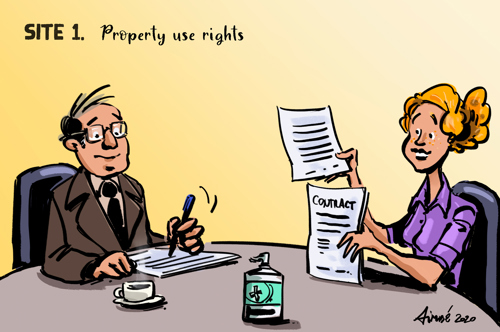- Real Estate, Renting and Co-ownership , Construction Law
- property use right , joint and several liability , property right , easements , usufruct , ground lease , right of superficies
On this first site, Victoria will show you one important innovation with regard to property law, namely the joint and several liability of the initial holder of the property use rights.
1. What are property use rights?
Ownership, shared ownership, property use rights and securities are all property rights.
The concepts of ownership and shared ownership speak for themselves.
The term "property use rights" stands for easements, usufruct, ground lease and right of superficies.
Are considered as securities: special privileges, the pledge, the mortgage and the right of retention.

2. What is new?
It goes without saying that the holder of a property right can only exercise this right together with the object to which it is attached.
For property use rights, however, there is an important novelty, namely the joint and several liability of the initial holder of the property use rights.
3. What does this mean?
Under the new legislation, the first holder of the property use right - i.e. the beneficiary of an easement, usufruct, ground lease or right of superficies - will be jointly and severally liable with the acquirer, to the owner of the property which serves as basis of the property use right. Therefore, the first holder of the property use right can be held liable for payment at any time, even after the transfer of the property.
The joint and several liability relates to the personal obligations which constitute consideration for the establishment of the property use right, and are payable after the transfer.
The transferor is solely liable for the obligations which were due and payable before the transfer.
This means, for instance, that the owner of an apartment who has to pay an annual compensation to the landowner within the context of a ground lease agreement, can be held liable, together with the new owner, for the payment of the annual compensation, even after he has sold his apartment.
As first owner of a property that is charged with a property use right, you remain liable for payment even if you have already resold the property.

4. What provisions should be provided in the authentic deed?
It is possible to derogate from the principle of joint and several liability.
As previously stated, this can be explained by the fact that, except otherwise stipulated in the new Civil Code or with regard to definitions, the new property law is complementary (and thus not mandatory).
As the owner of the property use right, e.g. the landowner in the context of a development project, it is of course in your interest not to derogate from this rule. The more people can be held liable, the more certain you can be about getting your money back.
On the other hand, as a buyer of a property charged with a property use right, it is in your interest to derogate from this rule.
To find out how to formulate the clauses on your authentic deed(s), you can always contact the Seeds of Law specialists (+32 (0)2 747 40 07 or via info@seeds.law). Do not hesitate to let our team assist you.
Read alsoDiscover our e-book about the new property law
In our e-book "Together on a roadtrip through the new property law" you will discover a number of important topics about the new property law.








